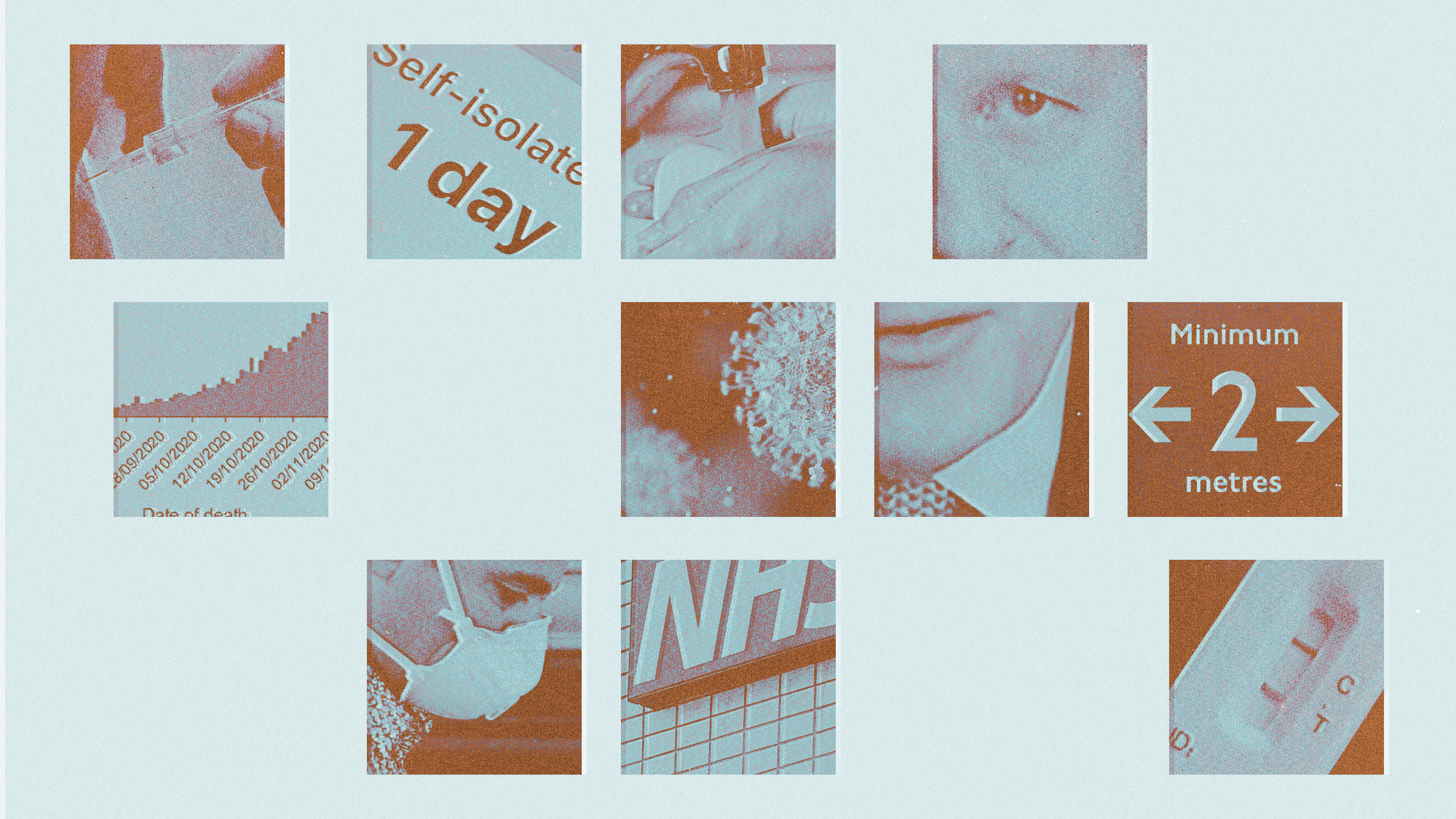Covid four years on: have we got over the pandemic?
Brits suffering from both lockdown nostalgia and collective trauma that refuses to go away

A free daily email with the biggest news stories of the day – and the best features from TheWeek.com
You are now subscribed
Your newsletter sign-up was successful
Four years on from the first UK lockdown, and almost a year since the World Health Organization declared an end to the Covid-19 emergency, many people are still feeling the effects of the pandemic.
A survey by YouGov last week found that 44% of Britons feel the pandemic is "still ongoing". Some remain traumatised by the Covid crisis, while others are nostalgic for aspects of it – but what unites them is that they've yet to get over the experience.
What did the commentators say?
Lockdown was a "glorious 18-month holiday", said Giles Coren in The Times. We "got to bunk school, hunker down with our families, read books, learn languages, cook food, avoid foreign travel, dodge most social interaction" and go for "nice long walks in the park".
The Week
Escape your echo chamber. Get the facts behind the news, plus analysis from multiple perspectives.

Sign up for The Week's Free Newsletters
From our morning news briefing to a weekly Good News Newsletter, get the best of The Week delivered directly to your inbox.
From our morning news briefing to a weekly Good News Newsletter, get the best of The Week delivered directly to your inbox.
Fellow Times columnist Harriet Walker also admitted to a touch of "lockdown nostalgia", writing that "for many people, the enforced planlessness of lockdown was actually quite nice".
They are not alone. "Gen Z TikTok users from the US and the UK have reminisced about how much they are missing this period of their lives," said the Daily Mail last year. Some described the quarantine period as "their 'best year ever', and a 'well-deserved break'".
One TikToker said: "The way we took quarantine for granted makes me want to cry. There's literally nothing I miss more than beginning of 2020."
But many other people recall it less fondly. A study published last year in the Netherlands found that half of the PTSD cases being treated were related to Covid experiences.
A free daily email with the biggest news stories of the day – and the best features from TheWeek.com
"Are we all traumatised by the pandemic?" asked Claudia Canavan in Women's Health. Emma Svanberg, a psychologist specialising in trauma, said: "I don't think we're moving on from the pandemic. I think we're stuck." The pandemic was a "collective trauma, which is continuing to have ripples", Svanberg told the magazine.
Covid "delivered a body blow" to the nation, said The Guardian, and one "from which experts say recovery will not be easy or automatic". Babies and children "appear to have suffered developmental setbacks due to lengthy periods of isolation", while "older people, who needed protecting most from Covid, were also uniquely vulnerable to the effects of physical inactivity".
A "mindset shift that persists so long after Covid" means "the fear must now be that it is permanent", wrote Annabel Denham in The Telegraph. Throughout lockdown, we told children that "it was fine – even desirable – not to go to school", but absenteeism remains "stubbornly high". There has also been a "surge", particularly among younger people, in mental ill health.
A couple from West Sussex who are still shielding four years on from the first Covid lockdown said they feel they have been "left behind". Gayle and Leslie Howard still wear masks when they leave the house. "There is over a million people still affected by shielding following the pandemic, but we are suffering," Gayle, who had a kidney transplant in 2018, told the BBC.
The pandemic could also have had an intellectual impact. A recent study suggested that "even people who completely recovered from what felt like a mild dose of Covid" might have suffered a cognitive deficit equal to three IQ points, compared with someone who was never infected, wrote Pilita Clark in the Financial Times.
While emphasising that the study had "limitations", she said that in the US this would mean an additional 2.8 million adults would be left with an IQ below 70, a threshold that suggests a level of intellectual disability that can require "significant societal support".
What next?
The next pandemic is just "around the corner", Dr Nathalie MacDermott, clinical lecturer in infectious diseases at King's College London, told Sky News. The world is "rife for outbreaks".
We "want to believe we can just go back to normal and I understand that entirely", she said. "But the next pandemic is around the corner – it might be two years, it could be 20 years, it could be longer."
From 1 April, people concerned about or susceptible to the coronavirus will be able to get a Covid vaccine at Boots for £99. It is the first time a Covid-19 vaccine has been available outside the NHS since the mass vaccination programme was launched in December 2020.
Chas Newkey-Burden has been part of The Week Digital team for more than a decade and a journalist for 25 years, starting out on the irreverent football weekly 90 Minutes, before moving to lifestyle magazines Loaded and Attitude. He was a columnist for The Big Issue and landed a world exclusive with David Beckham that became the weekly magazine’s bestselling issue. He now writes regularly for The Guardian, The Telegraph, The Independent, Metro, FourFourTwo and the i new site. He is also the author of a number of non-fiction books.
-
 What to know before filing your own taxes for the first time
What to know before filing your own taxes for the first timethe explainer Tackle this financial milestone with confidence
-
 The biggest box office flops of the 21st century
The biggest box office flops of the 21st centuryin depth Unnecessary remakes and turgid, expensive CGI-fests highlight this list of these most notorious box-office losers
-
 The 10 most infamous abductions in modern history
The 10 most infamous abductions in modern historyin depth The taking of Savannah Guthrie’s mother, Nancy, is the latest in a long string of high-profile kidnappings
-
 ‘Zero trimester’ influencers believe a healthy pregnancy is a choice
‘Zero trimester’ influencers believe a healthy pregnancy is a choiceThe Explainer Is prepping during the preconception period the answer for hopeful couples?
-
 ‘Longevity fixation syndrome’: the allure of eternal youth
‘Longevity fixation syndrome’: the allure of eternal youthIn The Spotlight Obsession with beating biological clock identified as damaging new addiction
-
 A Nipah virus outbreak in India has brought back Covid-era surveillance
A Nipah virus outbreak in India has brought back Covid-era surveillanceUnder the radar The disease can spread through animals and humans
-
 Is the US about to lose its measles elimination status?
Is the US about to lose its measles elimination status?Today's Big Question Cases are skyrocketing
-
 RFK Jr. sets his sights on linking antidepressants to mass violence
RFK Jr. sets his sights on linking antidepressants to mass violenceThe Explainer The health secretary’s crusade to Make America Healthy Again has vital mental health medications on the agenda
-
 Covid-19 mRNA vaccines could help fight cancer
Covid-19 mRNA vaccines could help fight cancerUnder the radar They boost the immune system
-
 Is this the end of ultraprocessed foods?
Is this the end of ultraprocessed foods?Today's Big Question California law and the MAHA movement are on the same track
-
 Can TrumpRx really lower drug prices?
Can TrumpRx really lower drug prices?Today’s Big Question Pfizer’s deal with Trump sent drugmaker stocks higher